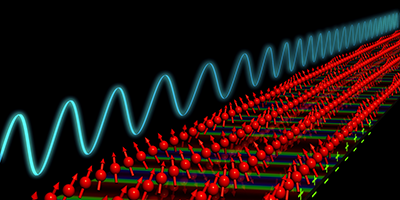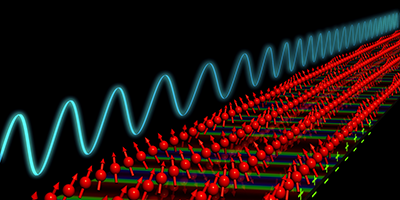Electronic Tuning of Spin Waves
The magnetically stored information on a hard drive could one day travel directly through a computer as a wave of magnetic spins. Performing computations with these spin waves, or magnons, would possibly require less power than computing with electric currents. A new development, described in Physical Review Letters, could help bring magnonic devices to reality, with researchers demonstrating the first electric-field control of magnons in a commonly used magnonic material.
A magnon is a collective oscillation in the alignment of magnetic spins, but without any displacement of charge. Using microwave fields, researchers can launch these waves down thin magnetic films called magnonic waveguides. Such magnons can potentially carry information through variations in their amplitude or their phase, so controlling these variables is an important goal of current research.
A popular choice for magnonic waveguides is the magnetic insulator yttrium iron garnet (YIG), which has very low magnon attenuation. Manipulating magnons in YIG can be done with magnetic fields, but a more practical solution would be to use electric fields, which can be applied locally through gates and thus offer better possibilities for device integration. However, YIG is typically considered to be insensitive to electric fields. Hong Tang of Yale University and his colleagues show that, in fact, a transverse electric field applied to a YIG waveguide can alter the magnon phase. Using an interferometer setup, the team detected a phase shift that depended on the electric field strength. As recently predicted, this tuning capability arises from a large spin-orbit interaction that couples spin to electron orbital motion (which is affected by the electric field). The results could be used to develop simple, low-power magnonic logic gates. – Michael Schirber





